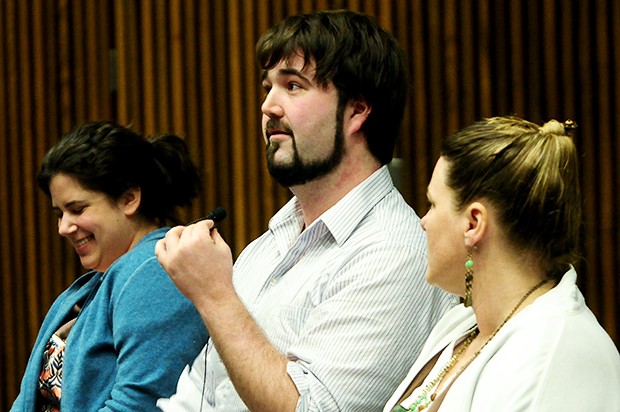âÄúAre you having sex with men, women or both?âÄù âÄúWhat kind of sex are you having?âÄù Representatives from the Red Door Clinic , the Midwest Health Center for Women and the Rainbow Health Initiative (all local organizations with programming specific to GLBT health issues) posed these questions to about 100 students from the Academic Health Center schools Monday in the first of a weekâÄôs worth of lectures focusing on health issues in the gay, lesbian, bisexual and transgender community. Sponsored by the Gay Lesbian and Ally Medical Students and American Medical Students Association, GLAM President Virat Madia said many medical students and other health profession students arenâÄôt exposed to the health disparities in the GLBT community. MadiaâÄôs brother is former Minnesota Congressional candidate Ashwin Ma dia. For instance, many students may not have known that women who have sex with women (who may or may not identify as being lesbian) are still at risk for STDs and unplanned pregnancy, said Jessica Zaldivar from the Midwest Health Center for Women, which is starting a clinic specifically to serve women who have sex with women. Frequently, Zaldivar and her co-panelists, Derek Blechinger , community health specialist at the Red Door Clinic, and Loretta Worthington , director of programs at the Rainbow Health Initiative, urged the students, mostly first and second years in the Medical School, to think beyond traditional sexuality labels. âÄúIf a patient presents and says, âÄòIâÄôm a lesbian,âÄô how many of you would still ask if she has sex with men?âÄù Blechinger asked the auditorium âÄî only a few hands went up. Worthington, who said she identifies as a lesbian, said itâÄôs important for the students to discuss the health disparities in the GLBT community. âÄúHealth care starts at the med student level,âÄù she said. âÄúIf med students are taught LGBT health care and âĦ some barriers to look for, they become educated in a way that older, traditional health care providers have not.âÄù Doctors generally either donâÄôt ask questions about sexual health or donâÄôt ask the right questions about sexual health, Worthington said. âÄúTheyâÄôre not asking folks if they have partners at home, theyâÄôre asking them if theyâÄôre married. And, right away, that sets up a barrier,âÄù she said. Madia said the events were entirely student run and student organized, and the groups took it upon themselves to address an area that largely goes unmentioned in most health profession training. Vincent Au , an openly gay second-year medical student, said sometimes he feels a special obligation to serve the GLBT community, but added that he feels the same toward patients in the Asian American community. âÄúBeing part of the minority groups, you tend toward wanting to help that group itself,âÄù he said. Au, who is also involved with GLAM, said he is most looking forward to the lecture focusing on teen issues. âÄúI donâÄôt know what IâÄòd do if a teen came to my clinic and had all sorts of trouble that I didnâÄôt know how to deal with,âÄù he said. During the discussion, Worthington noted that GLBT youths have higher suicide rates than their peers. Blechinger, who has spoken at the medical student lectures in the past, said MondayâÄôs session, which acted as a primer to GLBT health issues, went really well. âÄúPeople asked very brave questions, which is great,âÄù he said, âÄúbecause you canâÄôt understand what you donâÄôt know without asking.âÄù Susan Pleasants , a second-year medical student who calls herself a âÄúvery outâÄù lesbian, said the lectures go beyond the topics that are addressed by the mandatory Human Sexuality course the medical students take over the summer. The University of MinnesotaâÄôs is the only medical school in the country to require such an extensive course, she said, and in general, Minneapolis has plenty of GLBT-friendly resources. But Blechinger, who is also openly gay, isnâÄôt quite as optimistic. While GLBT-friendly resources exist if you know where to find them, a patient choosing clinics at random would have âÄúnot even a 50-50 chance of having a doctor who is not only friendly to LGBT individuals but also knowledgeable about what tests need to be done,âÄù he said. The panel wrapped up by presenting a hypothetical patient to the students and having them walk through the questions they would ask. The panelists acknowledged the topics they were throwing out arenâÄôt usually addressed in the classroom or in polite conversation, but encouraged the students to practice asking more open sexual health questions to their friends and classmates. âÄúIf you canâÄôt say anal sex or anal pap smear to your best friend âĦ will you be able to say it to a patient?âÄù Blechinger said. âÄî Emma L. Carew is a senior staff reporter.
Med students host weeklong GLBT health care event
The lectures aim to train a new generation of health professionals to be more GLBT-friendly.

Image by Chris Roberts
Jessica Zaldivar, left, Derek Blechinger, middle, and Loretta Worthington spoke about the challenges of discussing sexual health matters with patients at a panel discussion Monday.
Published March 9, 2009










